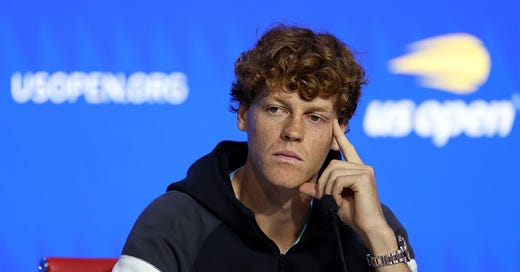There is a target on Jannik Sinner's back
And, writes George Bellshaw, it is not remotely his fault
On the eve of the US Open, tennis - which has a penchant for drama - was thrust into its latest controversy.
It was revealed that Jannik Sinner, the men’s world No 1 from Italy, had failed two drugs tests.
The two positive samples containing banned steroid clostebol were taken five months ago during Indian Wells. Sinner’s lawyers got busy behind a veil of opaqueness, and he avoided any provisional suspension.
Nearly half a year on, Sinner - fresh from winning the title in Cincinnati - was publicly cleared of any fault or negligence by an independent tribunal. His physiotherapist Giacomo Naldi (who has since been sacked by Sinner) had cut his finger on a scalpel and borrowed a medical spray designed to heal cuts from Sinner’s fitness coach Umberto Ferrara (also since dismissed by the world No 1). He proceeded to give Sinner massages, without gloves, over a nine-day period. The International Tennis Integrity Agency (ITIA) accepted the explanation that Sinner had inadvertently ingested the banned substance through lesions on his skin.
“In my mind I know that I haven't done anything wrong,” the 23-year-old Australian Open champion said in the buildup to the last grand slam of 2024. “I had to play already months with this in my head, but just remembering myself that I haven't done really anything wrong. I always respect that these rules, and I always will respect these rules of anti-doping.
“Just obviously a relief for myself having this result.”
While his relief was clear for all to see, if Sinner and co hoped that would be the end of the matter, they would be sorely mistaken.
Unusually for a sport whose player body rarely turns against one of their own (unless your name is Nick Kyrgios), the lack of transparency from the ITIA prompted a furious backlash.
“Different rules for different players,” tweeted Canada’s Denis Shapovalov. “Can’t imagine what every other player that got banned for contaminated substances is feeling right now.”
While others - including Simona Halep and Tara Moore - faced suspensions and lengthy proceedings of more than a year before receiving verdicts from independent tribunals, Sinner faced no suspension and a relatively swift resolution to his case. This has, unsurprisingly, led to accusations of preferential treatment from a disgruntled player body - even if it should be acknowledged that both Moore and Halep’s cases were significantly more complex.
It is difficult to understand why this wasn’t swiftly and publicly disclosed, even if deemed that a provisional suspension wasn’t appropriate. And, once again, tennis has left itself susceptible to cries of foul play by seemingly treating this case differently.
Sinner was adamant that there was no preferential treatment and suggested his team’s ability to quickly identify the direct source of the positive test allowed his circumstances to differ to others. Other cases of contamination often require months of investigation into supplement batch numbers.
He added: “It's every player who gets tested positive has to go through the same process. There is no shortcut, there is no different treatment, they are all the same process.
“I know sometimes the frustration of other players obviously. But maybe because they got suspended is they didn't know exactly where it comes from, also what substance, but the main reason is where it comes from and how it entered in his own system.
|We knew it straightaway, and we were aware of what happened. We went straightaway, and I was suspended for two, three days. I couldn't practice and everything. But they accepted it very, very fast, and that's why.”
All eyes will be on Sinner heading into the US Open. Should he claim the title - far from a guarantee with former champions Daniil Medvedev, Carlos Alcaraz and Novak Djokovic all lying in his path - the intensity of the spotlight will burn even brighter.
“It has been a very tough moment for me and my team,” said Sinner. “It still is, because it's quite fresh, this everything.
“Here I also know who is my friend and who is not my friend because my friends, they know that I would never do that, and sticking together.
“About the reputation, we will see now, now moving forward. Because this, I can't really control.”
Regardless of how Sinner’s reputation is damaged, for tennis this is another PR disaster.
There is no question that attempts to resolve this matter in the back channels have fanned the flames of fury and led to accusations of favouritism for the sport’s most wealthy, recognisable and powerful (something that is, admittedly, not unique to tennis).
It’s clear there was no intent on Sinner’s part: but should that really matter? For years tennis has dealt with failed drugs cases with excuses ranging from, but not limited to, snogs in nightclubs, contaminated meats and post-exercise rubdowns.
These have all ultimately been proved and suspensions and bans significantly reduced. Given how hard intent is to prove, should it even be in the picture?
If tennis wants to reduce the drama and been seen to be as intolerant to doping, while providing a level playing field for all, then a blanket two-year ban for any positive test is surely the way forward.
But instead, tennis will languish in its latest controversy. And Sinner - through little fault of his own - will have a target on his back in New York.



